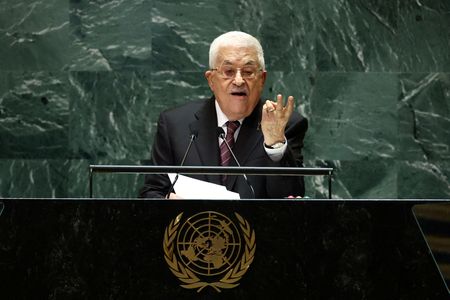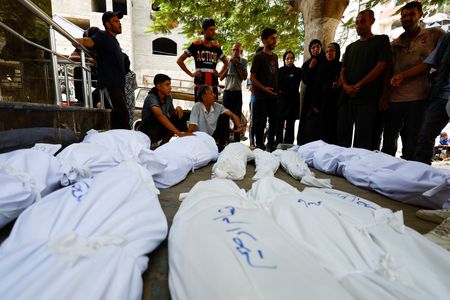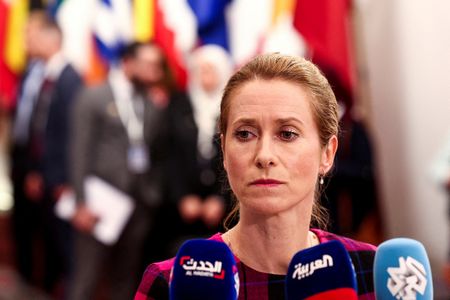By Ali Sawafta
RAMALLAH, West Bank (Reuters) – President Mahmoud Abbas faced criticism from allies and foes alike on Tuesday over a decree overhauling payments to families of Palestinians killed or jailed by Israel, a move to satisfy a U.S. demand that will likely deepen his unpopularity.
Palestinian Authority leader Abbas, 89, issued the decree on Monday overturning the system, long condemned by critics as rewarding attacks on Israel but viewed among Palestinians as a vital source of welfare for detainees’ families.
The sudden announcement seems aimed at removing a potential source of tension with U.S. President Donald Trump and an attempt to preserve the PA’s role as Washington bolsters its pro-Israeli approach to the conflict, Palestinian analysts said.
“The goal is to try to open a good page with Trump at a time when Trump has completely turned his back on the Palestinians by calling for displacement” of Palestinians from Gaza, said Hani al-Masri, a Palestinian political analyst in Ramallah.
Scrapping the system of salary-type payments, dubbed “pay for slay” by critics – a label rejected by Palestinians – has been a major demand of successive U.S. administrations. Abbas had long resisted pressure to halt the programme.
The PA will instead provide support to families of prisoners via a social welfare network, according to need rather than their length of imprisonment. Qadura Fares, the Palestinian official responsible for prisoner affairs, said between 35,000 and 40,000 families would be affected.
Fares, a member of Abbas’ Fatah Movement, told a news conference “a fireball” had been thrown in Abbas’ lap, underlining the huge sensitivities of ending a system introduced under the late Palestinian leader Yasser Arafat in the 1990s.
HAMAS CONDEMNS MOVE
Beneficiaries have included families in the Hamas-run Gaza Strip and Palestinians living in Lebanon, Syria and elsewhere – as well as those considered for release under the phased Gaza war ceasefire agreement between Israel and Hamas.
Israel’s foreign ministry dismissed the change as a ruse, saying payments would continue through other channels.
Masri said the public reaction would depend on how the move was implemented, saying that if payments to prisoners were totally scrapped, “it will be the straw that breaks the camel’s back”.
“This decision weakens the legitimacy and popularity of the president, which is already weak,” he added.
Palestinian opinion polls consistently show Abbas to be unpopular among Palestinians.
The Palestinian militant group Hamas condemned the decree saying it amounted to abandoning the cause “of the prisoners, the wounded, and the families of the martyrs” at a “critical juncture in the history of our Palestinian cause”.
The Ramallah-based Palestinian Authority, established under interim peace accords with Israel three decades ago, exercises limited self rule over patches of the Israeli-occupied West Bank.
The salaries and services it provides helped keep Abbas and his Fatah faction politically relevant in the face of expanding Israeli settlements and the political challenge posed by Hamas, which seized Gaza from Abbas’ control in 2007.
The decision comes as the PA faces mounting financial pressure from a slowdown in aid, a squeeze on a system of tax revenue transfers by Israel and a slump in contributions from Palestinians who have been shut out of the Israeli labour market by the war in Gaza.
Israel has been deducting the payments made by the authority from taxes collected on its behalf from goods that cross its territory to Palestinian areas.
The PA has appealed for more aid from Arab and European states to make up for the shortfall of billions of shekels but has so far struggled to make headway.
(Additional reporting by James Mackenzie in Jerusalem and Nidal al-Mughrabi in Cairo; Writing by Tom Perry; Editing by Alison Williams)










